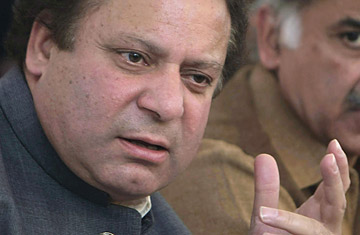
Pakistan's former Prime Minister Nawaz Sharif.
It's an odd situation, to be widely considered a nation's most popular politician yet simultaneously barred from ever holding public office again. But that's the situation facing Pakistani opposition leader and long-time political mainstay Nawaz Sharif after a Feb. 25 decision by Pakistan's Supreme Court. The ruling declared both Sharif and his brother, Shahbaz, ineligible to hold office, ostensibly because of Sharif's criminal convictions after he was tossed from office in a 1999 coup by Gen. Pervez Musharraf.
Sharif says he doesn't buy the explanation and dubbed the court's decision a "nefarious act" by the current Pakistani president — Asif Ali Zardari — designed to quash Sharif's electoral threat. He has called for an anti-government rally next month, but his supporters aren't waiting. Widespread and violent protests broke out after the court's decision, adding considerable tension to a country already near its breaking point. (See pictures of Pakistan's vulnerable North-West Frontier Province.)
Fast Facts
• Is 59 years old. Born December 25, 1949 in Lahore, Pakistan.
• Current leader of the Pakistan Muslim League (PML) party, he has a net worth of more than $1 billion, making him one of Pakistan's richest people.
• Educated at Government College Lahore before completing a law degree at Punjab University.
• Entered politics as a provincial politician from Punjab when he was hand-selected as finance leader by Pakistan's president Zia ul-Haq in 1981. He later became Punjab's chief minister in 1988, where he used his influence to challenge prime minister Benazir Bhutto, who took power after ul-Haq died in a plane crash.
• Replaced Bhutto as prime minister for the first time in 1990 but was dismissed on corruption charges by then-president Ghulam Ishaq Kahn.
• Re-earned the prime minister spot in 1996, replacing Bhutto for the second time after she was bounced from office on corruption charges.
• In 1997 elections, his party won a large majority and Sharif used his political capital to strike Pakistan's Eighth Amendment, stripping the president of his powers to remove the prime minister from office.
• His army chief, Pervez Musharraf, removed Nawaz from office in a bloodless coup in 1999 after Nawaz tried to limit the power of the military. Nawaz was tried and convicted on charges of air piracy after he refused to let the plane carrying Musharraf, who had been abroad, land in Pakistan during the last hours of his presidency.
• Took a plea bargain to avoid life imprisonment and was exiled to Saudi Arabia along with 40 members of his family.
• Returned to Pakistan in September 2007 to compete in parliamentary elections, but when he was threatened with arrest at the airport upon landing, he returned to Saudi Arabia. He was allowed entry to the country two months later.
• Was banned on Feb. 25 from contesting office on the basis of his convictions in the air piracy case. Sharif accuses Zardari of orchestrating the ruling from the Supreme Court, which still lacks the justices Musharraf sacked.
QUOTES BY:
• "I am not fearful, I am fearless."
— speaking about the threat of arrest and imprisonment during his first attempt to return from exile in 2007. Sharif was turned away. The Times, September 11, 2007.
—on returning to Pakistan for good in Nov. 2007, USA Today, Nov 24, 2007
• "Musharraf has destroyed Pakistan. He is blindly following America's orders. The whole of Pakistan is drowned in blood."
— calling for Musharraf's impeachment,
International Herald Tribune, Jan 14, 2008
• "The nation should rise against this unconstitutional decision. People can work out for themselves whether this was the judges' decision or Zardari's."
— The Guardian, Feb. 25, 2009
QUOTES ABOUT:
• "He rushed to visit Bhutto at the hospital. He put a wreath on her grave. He's showing powerful leadership when the country feels at a loss. He's learned a lot in exile."
— Sartaj Aziz on Sharif's response to the Bhutto assassination. Aziz was a minister under Sharif during Sharif's terms as prime minister. Washington Post, Jan. 4, 2008
• "When the people's representatives are barred from entering assemblies then what kind of democracy or justice can you expect?"
— Ali Asghar Manda, a member of the PML, International Herald Tribune, Feb 26, 2009
• "It's unfortunate the ferocity of the reaction and the personalized attack on the president has soured the atmosphere."
— Government spokesman in the wake of the Supreme Court ruling, New York Times, Feb. 25, 2009
